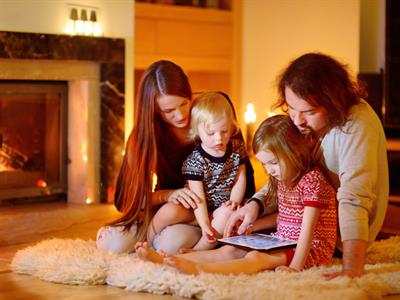PDF chapter test TRY NOW
Edgar Albert Guest emphasises the bond between family members in his poem 'The Stick-together Families'. He urges the readers to stick to the family, no matter what the situation is. The poem acts as a reminder to embrace the warmth and love of family. This notion is even more evident as the poet uses the phrase stick-together as an adjective to describe the family he is discussing about, similar to adjectives such as happy, joint, nuclear, etc., being added to the noun 'family'.
Guest says that families that stick together are happier compared to estranged families. As human beings, we all crave warmth and support. Man is a social animal and is not designed to live alone from the rest of the pack. Right from the earlier days, human beings lived as a pack and moved together. When one person faces trouble, the rest would pitch in their support and help them out of the situation. Similarly, families provide emotional and materialistic help when one is faced with any difficulty. The poet also talks about estranged families, where the members do not care for each other and are led by their own selfish motives. Siblings are meant to have each other's back, and if they fail to do so by spewing hatred, then they may not achieve happiness. When they go on their separate ways, forgetting their responsibilities towards each other, their life may not be as fruitful as a family that sticks together.

Happy siblings
The poet goes on to give a very warm picture of a group of family members sitting around a fireside in a circle. The warmth provided by the fire on a chill day represents the warmth given by family when one is feeling blue. These people who are there for one another are the happiest people that ever existed. They are also referred to as wholesome because they do not exist as mere parts. The bond makes them wholesome, and no power can separate them until death. The poet also says that there can be a lot of conventions and gatherings that are held for various purposes, such as business meets or political ones, but nothing can compare to a little family gathering organised after a busy day. It is the finest convention ever held under the sun, as it involves a lot of effort. After a long day of work and stress, meeting or spending time with loved ones is what makes life bearable.

A Family gathering
The poet explains that any individual is prone to achieve more success when they do so in packs. He says that one's social status or class does not indicate their level of achieving success in life. Irrespective of people belonging to rich families or poor families, people can make bad decisions which can be due to lack of awareness. People imagine themselves to be wise just because they have a rich upbringing, a good education and comforts. They decide to move away from the family, thinking that it is a wise decision to move ahead in life. People who come from a poor family may also decide, owing to insecurity or desire to achieve things in life.
The poet says that the decision to move away from family, by either people belonging to rich families or poor families, might end in a bad state. They are in a rush and very quickly shatter all the family ties. They tend to assume that success finds one in solitude. But if one does not have anyone to cheer, then there is no point in achieving success. When each family members goes in search of their pleasures, they lose the bond within the family. Most often, people like to explore newness in life. Since families are conventional and always readily available, they get tired of it, which makes them seek fun in strange instances and people.

Wandering alone
They like to wander with new and strange people and have fun with them. Although the newness and strange elements in the relationship can excite them, it will soon wane as there is no depth in those relationships. The poet says that one might only harvest bitterness with a stranger and hence reap the same. Also, these bonds are empty as it is established based on the feeling of void and the urge to seek a companion. The poet says that children do not have this problem as they seek the company of family at an early stage and do not wander about. Hence the children are the wisest and are the stick-together types.

Meeting strangers
The poet tries to break misconceptions about families in the young minds of people. He re-emphasises the idea discussed in stanza 2, that people might fancy wandering and getting in touch with strangers. People might think that they can be glad only if they roam, leaving the family behind. The poet understands that people, especially young ones, might think that they might achieve success and will be able to smile only when they wander around without any aim. More than believing a close family member, they tend to think that a stranger is a true friend. They travel around the world, seeking an element to fill the void within them. According to the poet, this kind of behaviour is a waste of time, as they are uselessly pursuing something that is already available to them. There is no necessity to search elsewhere when one happens to have a family that supports each other.
The poet says that the people who are the gladdest are the ones who have a family to go back to after a stressful situation, and the siblings who have each other's back are more prone to grow together and share the fun. In the final stanza, the poet emphasises the importance of being a stick-together family. People need to understand that it is the little things and trivialities that make life meaningful. One can win these joys of the earth, such as experiencing love, warmth, and the joy of caring, only by staying closer to the family. They are the ones to find the sweetest music of life and the best kind of excitement from life. He refers to the joy of living together to be as sweet as music.

The little things is what matters
Family is like the roof of the home that protects one from any kind of danger such as sun or rain. It is also the one roof that preserves all the charm that life can offer to any person. Within a playground, one can find a beautiful playground where one can relax after a stressful day. One can also find a happy and safe spot to live in within the embrace of the family members. After all, every action performed by an individual is a step to get closer to being loved and cared for. We all crave warmth and comfort, which can be offered only by families. The poet ends the poem with a call to the ones who have been roaming around to come back to the warmth of the fireside, beside one's family, and cherish one's kith and kin.

Family cuddled up near a fireside
